|
|
|
Sort Order |
|
|
|
Items / Page
|
|
|
|
|
|
|
| Srl | Item |
| 1 |
ID:
133474
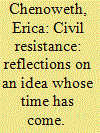

|
|
|
|
|
| Publication |
2014.
|
| Summary/Abstract |
IT HAS BEEN THREE YEARS SINCE WHY CIVIL RESISTANCE WORKS HIT THE shelves.1 When Maria J. Stephan and I sent the final galleys into the publisher, we had no idea that the Arab Spring was about to grip the world; that the Occupy movement would reenergize the protest sector in advanced
democracies; or that countries as diverse as Turkey, Venezuela, Ukraine, Thailand, and India would be rocked by nonviolent resistance against entrenched authority, lack of economic opportunity, and corruption. While many people have cataloged the global decline in armed conflict, few have noticed that, in the meantime, the use of civil resistance has been on the rise.
|
|
|
|
|
|
|
|
|
|
|
|
|
|
|
|
| 2 |
ID:
133475


|
|
|
|
|
| Publication |
2014.
|
| Summary/Abstract |
Inclusive participation by all states is now taken for granted in many global governance efforts, but this was not always the normal practice. Nineteenth-century multilateralism, embedded in a world of "great powers," actively rejected broad participation, valuing small numbers, hierarchy, and status in coordinating action. Construction of broader participation norms in the late nineteenth and early twentieth centuries was a joint project that owes much to innovations in the Americas and regional norms developed within that group as it organized meetings among the American states. Central to these norms was sovereign equality that, in the American context, entailed universal participation of all American states and voting on a one state-one vote basis at conferences. This article traces the spread of these norms from the Americas to the Hague Conferences of 1899 and 1907, and highlights the varied sources for many of our contemporary multilateral practices in these early events.
|
|
|
|
|
|
|
|
|
|
|
|
|
|
|
|
| 3 |
ID:
133481
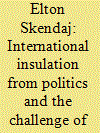

|
|
|
|
|
| Publication |
2014.
|
| Summary/Abstract |
Can international actors build effective state bureaucracies in postwar countries? While the literature on state institutions suggests they are best built under local ownership, this article shows how international actors in collaboration with local actors managed to build two effective state bureaucracies in postwar Kosovo: the police force and the customs service. Contrary to the article's Hypothesis 1 on local ownership, international actors insulated the effective bureaucracies from political and societal influences in order to prevent them from becoming sites of patronage. Thus, these institutions built on meritocratic recruitment and promotion. Employing a comparative research design, the article utilizes national survey data as well as data from 150 semistructured interviews conducted during ten months of fieldwork in Kosovo. By contrasting the state's constituent bureaucracies, which vary in effectiveness, and thus avoiding the reduction of the state to a unitary abstract actor, this research offers a fresh perspective on postwar state building. Furthermore, it contributes three innovative sets of indicators to measure effective bureaucracies: mission fulfillment, penalization of corruption, and responsiveness to the public.
|
|
|
|
|
|
|
|
|
|
|
|
|
|
|
|
| 4 |
ID:
133479
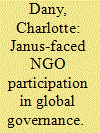

|
|
|
|
|
| Publication |
2014.
|
| Summary/Abstract |
Increasingly, nongovernmental organizations participate in negotiations within international organizations as well as in global working groups and discussion forums. This trend is commonly said to enable the influence of the participating NGOs. Yet this article highlights the negative effects of the high level of NGO participation on the NGOs' influence. It shows, in the case of the UN World Summit on the Information Society, how the NGOs' influence is reduced to less relevant issues and how this influence turns out to be highly selective: while the views and demands of a few NGO actors are successful, more diverse views from the broader NGO community become neglected. This suggests greater caution regarding the usual claim that more is necessarily better with regard to NGO participation in global governance.
|
|
|
|
|
|
|
|
|
|
|
|
|
|
|
|
| 5 |
ID:
133477
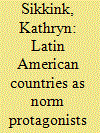

|
|
|
|
|
| Publication |
2014.
|
| Summary/Abstract |
Latin American governments, social movements, and regional organizations have made a far greater contribution to the idea and practice of international human rights than has previously been recognized. Most discussions of the global human rights regime stress its origins in the countries of the Global North. This article explores the role of Latin America states as early protagonists of the international protection of human rights, focusing in particular on the American Declaration of the Rights and Duties of Man. Histories of human rights in the world emphasize the Universal Declaration of Human Rights, passed by the UN General Assembly on 10 December 1948, as the founding moment of international human rights. Few know that Latin American states passed a similar American Declaration of the Rights and Duties of Man a full eight months before passage of the UDHR. The American Declaration thus was the first broad enumeration of rights adopted by an intergovernmental organization. This article explores the American Declaration as an example of often overlooked Latin American human rights protagonism that has continued to this day, and that calls into question the idea that human rights originated in only the Global North.
|
|
|
|
|
|
|
|
|
|
|
|
|
|
|
|
| 6 |
ID:
133476


|
|
|
|
|
| Publication |
2014.
|
| Summary/Abstract |
What is the origin of the norm that international institutions should support the economic development of poorer countries? It is commonly argued that the norm of international development was pioneered by US president Harry S. Truman in a famous 1949 speech as a means of serving US economic goals in the early Cold War. But this norm in fact emerged much earlier from Sun Yat-sen's thinking in China in 1918 and after that from Latin American preferences in the inter-American context of the 1930s. The latter were particularly influential in encouraging US officials to design, in the early 1940s, the first international institution with a strong development mandate: the International Bank for Reconstruction and Development. During the negotiations leading up to the 1944 Bretton Woods agreements, Latin American policymakers supported and reinforced the US plans, as did representatives of China, India, and Eastern Europe. For officials from these countries and regions, international development promised support for their increasingly ambitious domestic development goals while minimizing the costs that had often been associated with private international investments in the past.
|
|
|
|
|
|
|
|
|
|
|
|
|
|
|
|
| 7 |
ID:
133480


|
|
|
|
|
| Publication |
2014.
|
| Summary/Abstract |
Subnational human rights institutions are often thought of as distinctly local bodies, addressing human rights concerns within their jurisdictions with little attention to the processes and mechanisms of the wider international human rights regime. This article shows that this description is no longer necessarily accurate. Rather, subnational human rights institutions can and do participate in the UN human rights regime in a number of important ways. Such participation is potentially beneficial to the UN human rights processes, and subnational human rights institutions have in fact been welcomed by institutional actors at the UN. Nevertheless, the UN, national human rights institutions, and subnational human rights institutions themselves can all do more to ensure that subnational human rights institutions are able to participate fully in the UN human rights system.
|
|
|
|
|
|
|
|
|
|
|
|
|
|
|
|
| 8 |
ID:
133478
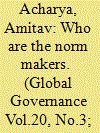

|
|
|
|
|
| Publication |
2014.
|
| Summary/Abstract |
It is increasingly recognized that the literature on norms, like that of international relations more generally, neglects or obscures the voices and role of non-Western actors. Part of the reason has to do with its relatively narrow conceptualization of agency: who are the norm makers and how do they create and diffuse norms? This article, drawing on the author's previous work on the subject, calls for a broader understanding of what norm making means and who should be considered as norm entrepreneurs. It then examines the debates and outcomes of the Asian-African Conference in Bandung in 1955 to illustrate some if not all of the key points about the normative agency of the developing countries in the construction of the postwar security order.
|
|
|
|
|
|
|
|
|
|
|
|
|
|
|
|
|
|
|
|
|